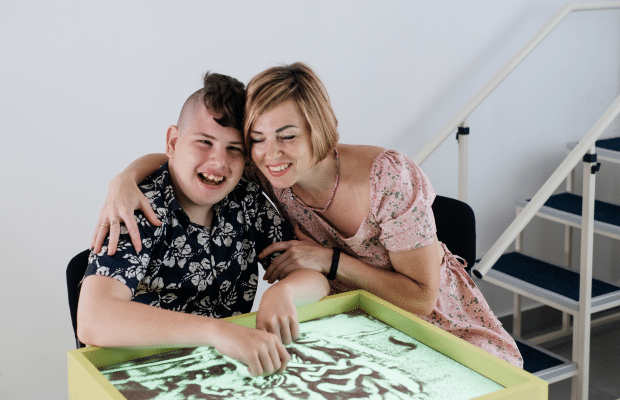What we cover in this article:
- What “Home & Living” supports mean under the NDIS
- The difference between SIL, SDA, ILO and MTA
- What types of respite or short-term accommodation may be funded
- Which housing or furniture costs the NDIS generally doesn’t cover
- How Plan Hero can help you understand and manage these supports
The NDIS funds supports that are directly connected to your disability and are considered reasonable and necessary. These supports must also represent value for money and help you work towards your goals — whether that’s living independently, building life skills, or having safe accommodation.
At Plan Hero, our Plan Managers help you understand these boundaries clearly. We won’t just say “no”; we’ll explain why something is or isn’t likely to be covered, and what next steps you can take.
Understanding NDIS Home & Living Supports
Home and living supports are designed to help participants live more independently and safely, in the most suitable environment for their needs.
The NDIS divides these supports into categories such as:
- Supported Independent Living (SIL)
- Individualised Living Options (ILO)
- Specialist Disability Accommodation (SDA)
- Medium Term Accommodation (MTA)
- Short Term Respite (Previously known as Short Term Accommodation)
Each support has different eligibility requirements and is funded for specific purposes.
Supported Independent Living (SIL)
SIL is one of the best-known home and living supports in the NDIS. It’s for participants who need help with daily tasks so they can live as independently as possible — usually in a shared home.
It’s important to note that SIL funding covers supports, NOT housing costs.
Examples of the types of support SIL funding will cover:
- Assistance with cooking, cleaning, or personal care
- Help with medication management
- Overnight support for safety or supervision
NOTE: It does not cover rent, groceries, or household bills. Those are everyday living expenses and are listed as non-NDIS supports.
So when are you likely to receive funding for Supported Independent Living (SIL)? The NDIS will provide SIL funding in your NDIS plan when:
- You have higher support needs that require 24-hour assistance or supervision
- The support helps you achieve goals related to independence or community living
- It’s considered the most cost-effective and suitable option for your circumstances
Funding levels depend on your assessed support needs, roster of care, and whether you share supports with others in your home.
Individualised Living Options (ILO)
ILO supports give you more flexibility and choice about where and how you live. Instead of a standard roster of care, ILOs are customised, tailored arrangements that might include:
- Living alone with formal and informal supports
- Living with a housemate or host
- Support workers visiting at set times or staying overnight
Funding under ILO generally covers designing, setting up, and maintaining your living arrangement and does not cover rent or utility bills.
ILO may be a good fit if you want to live independently but don’t need 24-hour support. You might, for example, need regular drop-in support for personal care or help managing routines, but not constant supervision.
The NDIS typically funds ILO in two stages:
- Exploration and Design – to plan your living setup, including support networks and risk management.
- Support Package – to fund the agreed arrangement once approved.
Specialist Disability Accommodation (SDA)
Specialist Disability Accommodation (SDA) is a type of housing built for people with very high support needs or extreme functional impairment. It does not cover the support staff — it pays for the bricks and mortar, the building itself.
SDA properties have features such as:
- Wide doorways or hallways for wheelchair access
- Ceiling hoists
- Reinforced walls for safety
- Accessible bathrooms or assistive technology built in
SDA funding is paid directly to the housing provider, not to participants. Participants still pay rent and living costs (like electricity or food), but at a regulated contribution amount.
Generally, SDA is only included in plans for participants who:
- Need specialist housing to live safely and access supports
- Have an SDA housing assessment
- Are eligible for SDA in their NDIS plan
The NDIS will not fund the purchase of a home, mortgage repayments, or land costs. These are clearly listed as excluded under non-NDIS supports.
Short Term Respite (Previously referred to as Short Term Accommodation)
STA (previously called respite) provides short stays away from your usual home to give both you and your carers a break.
It will not fund a stay for you and your carer together. It’s not for a holiday.
It can be used:
- For planned respite to maintain family or carer wellbeing
- To try new living situations or build independence
- After hospital stays when you need short-term support
STA funding generally covers:
- Accommodation costs
- Personal care and support
- Food and activities during the stay
The NDIS may fund STA for up to 28 days per year (in blocks or spread out), depending on your needs and goals.
Will the NDIS fund STA respite accommodation?
Generally, yes — if it’s directly linked to your disability and goals, and provides short-term support. However, the NDIS usually won’t fund luxury or holiday-style accommodation. For example, a stay in a hotel or resort is unlikely to be approved unless there’s clear evidence that it’s a reasonable and necessary support for your disability needs.
Will the NDIS fund group respite or activity-based respite?
Group respite may be funded when it provides meaningful support, skill-building, or social connection. It might include small group programs where participants learn daily living skills or take part in supervised community activities.
Funding is less likely if it resembles a recreational camp or holiday not linked to disability outcomes.
Will the NDIS fund in-home respite?
In-home respite may be funded when carers need a break and the participant still requires supervision or personal care. This could include a support worker coming to your home for a few hours or overnight, depending on assessed needs.
Medium Term Accommodation (MTA)
MTA provides short-term housing (usually up to 90 days) for participants who:
- Are waiting for their long-term housing or SDA to be ready, or
- Need a place to stay temporarily after hospital discharge or major home modifications.
The NDIS funds the accommodation cost during this period but does not cover everyday expenses such as food or utilities.
MTA is generally only approved when there’s a clear plan for permanent housing. It’s not a long-term solution or an emergency housing option.
Will the NDIS fund Shared Living Arrangements?
Shared living refers to situations where participants share a home with others, sometimes with formal supports (SIL or ILO) and sometimes with informal arrangements.
The NDIS may fund the supports that help you live safely in a shared environment — for example:
- Support with personal care
- Assistance coordinating shared household tasks
- Help managing routines or social interactions
It won’t cover rent, furniture, or general household costs, which are considered day-to-day living expenses.
Will the NDIS fund Transitional Housing or Hospital Discharge Support?
When someone leaves hospital, mental health care, or another institution, the NDIS may provide transition support if their disability-related needs have changed.
This can include:
- Short-term accommodation while waiting for home modifications or new supports
- Support coordination to arrange suitable housing or services
- Personal care or therapy during the transition period
These supports fall under the NDIS category “Assistance in coordinating or managing life stages, transitions and supports.”
Hospital discharge supports are time-limited and based on helping you stabilise and move into longer-term arrangements safely.
Will the NDIS fund Emergency or Crisis Accommodation?
The NDIS generally does not fund emergency accommodation for general crises, such as homelessness, domestic violence, or natural disasters. These are the responsibilities of mainstream housing and community services.
However, short-term accommodation may sometimes be funded when:
- The emergency situation is directly linked to a participant’s disability needs, or
- Existing housing has become unsafe due to disability-related factors (for example, equipment failure, care needs changing, or loss of informal supports).
Each situation is reviewed individually, based on what is reasonable and necessary.
Will the NDIS fund Overnight Care Services?
Overnight support may be included in a participant’s plan when required for health or safety reasons.
For example:
- Active overnight care: where support staff are awake and provide assistance during the night.
- Passive overnight care: where support staff sleep on-site and respond if needed.
Funding depends on assessed need and whether overnight supervision is required for safety or care. This support might be part of SIL, ILO, or daily personal activities.
Will the NDIS fund Rent Assistance?
Generally, the NDIS does not fund rent, mortgage payments, bonds, or standard accommodation costs. These are listed under “accommodation and household related” items in the non-NDIS supports list.
However, the NDIS may provide accommodation assistance or tenancy support when you need help finding or keeping a home — for example:
- Help applying for rental properties
- Support understanding tenancy agreements
- Medium Term Accommodation while waiting for permanent housing
Participants may also receive SDA or MTA funding (for the housing itself), but day-to-day living costs are still your responsibility.
Will the NDIS Furniture or Appliances for Disability Needs?
Generally, the NDIS doesn’t fund standard furniture or household appliances such as fridges, beds, or washing machines. These are everyday items.
However, funding may be possible when the item is:
- Modified or adaptive for your disability needs, and
- Considered reasonable and necessary.
Examples include:
- A height-adjustable bed prescribed by an occupational therapist
- A shower chair or hoist
- A modified kitchen bench for wheelchair access
- Assistive products for cooking, cleaning, or laundry tasks
These supports fall under the category “Assistive products for household tasks” or “Assistive products for personal care and safety.”
If you’re unsure whether a specific item may be covered, your Plan Hero Plan Manager can help you check the NDIS guidelines or connect with an allied health professional for advice.
Will the NDIS fund Accessible Hotel Stays?
Sometimes participants need to stay in accessible accommodation for disability-related reasons. Some examples include:
- When travelling for essential medical treatment
- During home modifications
- When standard accommodation isn’t suitable for accessibility needs
The NDIS generally does not fund holidays or leisure travel, but may fund accommodation if it’s the most practical or cost-effective way to meet a disability-related goal.
Funding decisions consider:
- Whether the stay is linked to your NDIS goals
- Whether it’s the most reasonable way to meet your support needs
- Whether other systems (like health or housing) should fund it
Everyday Living Costs — What the NDIS Does Not Fund
The NDIS cannot fund day-to-day living expenses that everyone has, regardless of disability. These are listed in the “Supports that are not NDIS supports” document and include:
- Rent, mortgage repayments, and household bills (electricity, gas, water, rates)
- Standard furniture and household items
- Home and contents insurance
- Vehicle purchases or fuel
- Holidays or travel not related to disability supports
If you’re unsure, ask your Plan Manager before you buy or book. We’ll help you check whether a support meets the reasonable and necessary criteria.
How Plan Hero Can Help
Understanding which home and living supports are funded, and how to claim them correctly, can be complex. The NDIS has detailed rules around what’s considered reasonable and necessary, and every participant’s situation is different.
At Plan Hero, we make funding guidance simpler.
We explain your funding in plain language, help you track your budgets, and ensure your providers are paid promptly. We also liaise with providers to clarify invoices and support categories, so you don’t need to repeat yourself.
You’ll always speak to your dedicated Plan Manager — a real person who knows your plan, your goals, and your situation. We keep your records up to date so you never have to start from scratch.
Whether you’re managing SIL payments, ILO arrangements, or occasional respite stays, our plan management team helps you stay compliant, informed, and confident about your funding.
References:
- NDIS Pricing Arrangements and Price Limits 2025–26
- Supports that are NDIS supports
- Supports that are not NDIS supports



